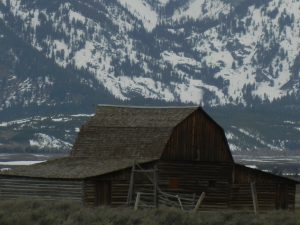The following reflection appeared in the Winter 2015 issue of Catholic Rural Life‘s magazine. The issue focused on “The Agricultural Vocation.” If you’re interested in purchasing this issue, I encourage you to visit Catholic Rural Life’s online store.
 Over the past few years, I have been meeting with a group of ranching families in Wyoming. I wish to get to know them better, as well as to better understand the unique challenges they face in ranching today. I recently met with them and gave a presentation on the life of Catholic Rural Life’s founder Archbishop O’Hara and his philosophy regarding the beauty of life that is possible when working so closely with the land, creation, and the Creator. Like Archbishop O’Hara, I am convinced that farming is a “way of life,” and not merely a way to make a living.
Over the past few years, I have been meeting with a group of ranching families in Wyoming. I wish to get to know them better, as well as to better understand the unique challenges they face in ranching today. I recently met with them and gave a presentation on the life of Catholic Rural Life’s founder Archbishop O’Hara and his philosophy regarding the beauty of life that is possible when working so closely with the land, creation, and the Creator. Like Archbishop O’Hara, I am convinced that farming is a “way of life,” and not merely a way to make a living.
I shared with them my conviction that farming is a way of life worthy of promoting and preserving. I spoke about the values and character that are forged when a family works together for a common living. After the presentation, one of the ranchers mentioned that “Farming is a business, no matter how you cut it.” He had a difficult time hearing that the “way of life” is equally important, if not more important. He obviously knows the demands of being required to “make a living.”
His wife, on the other hand, saw the beauty of the “way of life” that was being espoused and lived by them over the years. She told me, “Bishop, you are the first representative of the Church who has recognized the sacrifices that we have made to raise our families on the ranch. This is the first time we have ever heard the Church tell us they appreciate our way of life and what we do.”
This is Catholic Rural Life’s goal: to “raise up” this “way of life” and recognize it as invaluable and irreplaceable. A large and busy family unified by working together on a farm is a good worth promoting and protecting.
This is a truth that spurred us to organize the Faith, Food & the Environment symposium this past November at the University of St. Thomas in St. Paul, Minn. We brought together farmers, religious leaders, and academics to explore how faith traditions can help to provide solutions to challenges in agriculture today, and can strengthen the idea of farming as a vocation.
Some people may ask: “Is this a bridge too far?” I wish to point out one of the parables of Jesus for an answer to this question. In the parable of the Sower of the Seeds, we see the incredible Optimism of God, who sowed seed on a beaten path, rocky soil, thorny briar patches, and yes, good soil. God does not just do this by accident, but by intention that His Word can and should be distributed everywhere, with full expectation that something good will spring forth, namely, the new life which comes forth every time we introduce the Risen Lord and His Gospel values to the life reality of the world, be that in the home, the family, the work place or where we happen to take our rest.
This is exactly what we are proposing in developing a set of resources called The Vocation of the Agricultural Leader. We want all those who are engaged in the world of agriculture and food production to bring their faith and values to the table in the many decisions that are made on a day-to-day basis. God has given us everything that we need to provide for our families as well as for the many people who still go hungry in the world today. We are a people of faith and of hope, and we have the power of God with us in every endeavor.
0